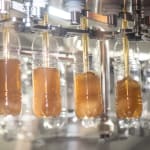
Sliced bread, BBQ sauces, drinks – the portfolio of the food and beverage producer Spitz in Upper Austria is highly diversified. Demand for energy drinks, juices and ice tea is particularly high at present. Too high for the company’s only aseptic line, which at times was even running in four shifts. Which is precisely why the people responsible at Spitz decided to upsize their filling capacities. Thanks to the fine performance of the existing wet-aseptic technology, they opted once again for Krones – but this time for dry-aseptics featuring a ContipureAseptBloc DN.
The new line began operation in August 2019, and is meanwhile running in three shifts. In each shift, one employee looks after the aseptic block, one supervises the labeller and the packer, and one is responsible for the palletising zone and supplying the line with new preforms.
Prior experience with Krones’ aseptics
Although Spitz was already familiar with Krones’ aseptic technology, in terms of process technology the new line differs from the existing wet-aseptic variant: the ContipureAseptBloc DN sterilises the preform’s entire surface in dry mode, using gaseous hydrogen peroxide. “This enables us to do without a rinser, which means we’ve been able to significantly reduce our water consumption and also the amount of wastewater created in the production operation,” says a gratified Markus Kröpfel, Technical Director at Spitz. Blow-moulder, filler and capper are in fully aseptic design and directly block-synchronised with each other. This guarantees not only a compact layout but also a high level of microbiological process safety.
Currently, Spitz is mainly using this line to bottle different variants of ice tea at a rating of 24,000 containers per hour in up to six different bottle formats. But by investing in the new aseptic line Spitz demonstrated farsighted receptiveness to entirely new product groupings. Because the ContipureAseptBloc DN will then in future also be able to handle innovative beverage types from the low-acid category: “We most definitely believe that the trend is towards naturalness: meaning no preservatives and as many natural ingredients as possible. There, aseptics are without a doubt the first choice, because that means we can bottle freshly brewed teas or still sports drinks, for example, to the very latest state of the art,” avers Walter Scherb jun., who heads the company in the third generation. “At the same time, by investing in a new line we wanted to keep our options open for new product categories. Krones won us over with its ContipureAseptBloc: now we are in a position to not only bottle pH-neutral beverages, but also to dose coconut or aloe vera into them, for example. This combination of a block-synchronised dry-aseptic line with an option for also handling fruit-chunk products is unique in Europe.”



